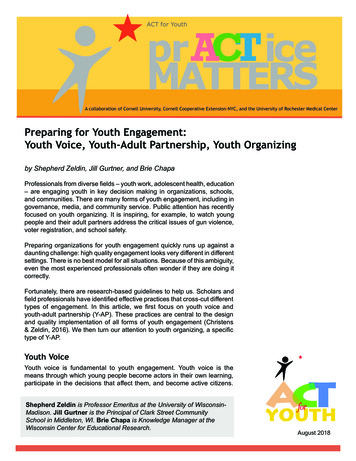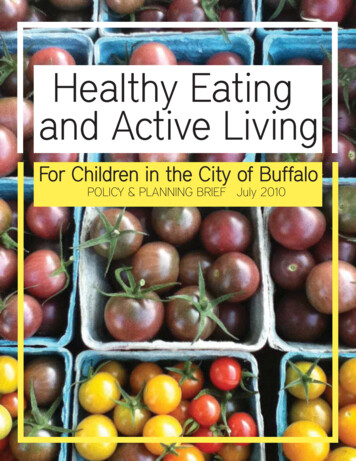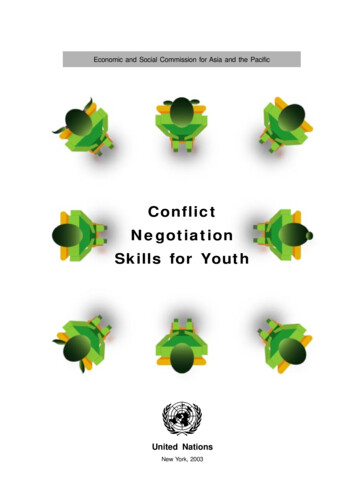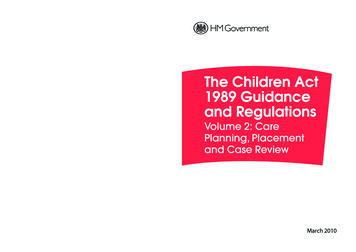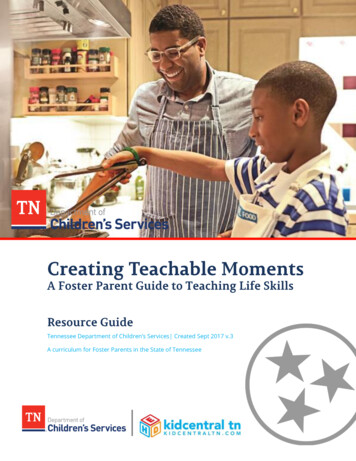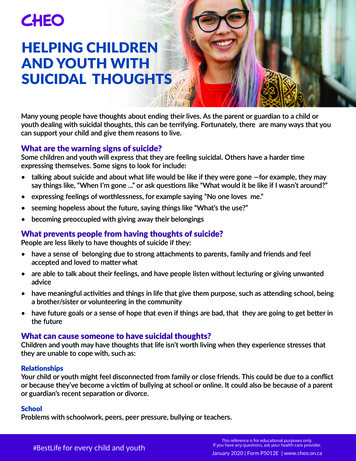
Transcription
HELPING CHILDRENAND YOUTH WITHSUICIDAL THOUGHTSMany young people have thoughts about ending their lives. As the parent or guardian to a child oryouth dealing with suicidal thoughts, this can be terrifying. Fortunately, there are many ways that youcan support your child and give them reasons to live.What are the warning signs of suicide?Some children and youth will express that they are feeling suicidal. Others have a harder timeexpressing themselves. Some signs to look for include: talking about suicide and about what life would be like if they were gone —for example, they maysay things like, “When I’m gone .” or ask questions like “What would it be like if I wasn’t around?” expressing feelings of worthlessness, for example saying “No one loves me.” seeming hopeless about the future, saying things like “What’s the use?” becoming preoccupied with giving away their belongingsWhat prevents people from having thoughts of suicide?People are less likely to have thoughts of suicide if they: have a sense of belonging due to strong attachments to parents, family and friends and feelaccepted and loved to matter what are able to talk about their feelings, and have people listen without lecturing or giving unwantedadvice have meaningful activities and things in life that give them purpose, such as attending school, beinga brother/sister or volunteering in the community have future goals or a sense of hope that even if things are bad, that they are going to get better inthe futureWhat can cause someone to have suicidal thoughts?Children and youth may have thoughts that life isn’t worth living when they experience stresses thatthey are unable to cope with, such as:RelationshipsYour child or youth might feel disconnected from family or close friends. This could be due to a conflictor because they’ve become a victim of bullying at school or online. It could also be because of a parentor guardian’s recent separation or divorce.SchoolProblems with schoolwork, peers, peer pressure, bullying or teachers.#BestLife for every child and youthThis reference is for educational purposes only.If you have any questions, ask your health-care provider.January 2020 Form P5012E www.cheo.on.ca
HELPING CHILDREN AND YOUTH WITH SUICIDAL THOUGHTSFears of being rejected and having to hide their true selfYouth who are gay, lesbian, bisexual or transgender may feel pressured to hide their sexual orientationor gender identity from others, causing immense stress. This is usually out of fear. They might worryabout being rejected by their family or worry about being “outed”. Another common secret is sexualabuse, which children and youth often hide out of fear or shame.Mental health problemsDepression, anxiety, eating disorders, or addictions can cause significant stress. These could beproblems that the child or youth experiences directly. They might also be problems parents orguardians or other family members are experiencing.How can I help someone who is feeling suicidal?1. Help them feel more connected.2. Help them gain control over their lives.3. Help them see that things will get better.What should I do if I think my child or teen is having thoughts of suicide?Don’t be afraid to open up a dialogue about suicide. It can be a difficult conversation to have, but don’tworry. Studies show that you can’t simply plant the idea of suicide in someone’s head. Instead, raisingthe topic will make it easier for your child or youth to confide in you.Check in with them.“How are you feeling these days?”Express your concerns.“I love you and I’m worried about you.”Listen.“You can tell me anything. I will not judge. I will accept you no matter what."Remark on what you’re noticing.“It seems like things have been stressful for you lately.”Ask about suicide.“Do you ever feel that life isn’t worth living?”Ask more if needed.“Do you ever think about ending your life?”If they do confide in you, you might say: “Thank you for letting me know. Let me give you a hug " I’m here for you. How can I support you?" Do you want me to listen? Would you like me to give you advice?”#BestLife for every child and youthThis reference is for educational purposes only.If you have any questions, ask your health-care provider.January 2020 Form P5012E www.cheo.on.ca
HELPING CHILDREN AND YOUTH WITH SUICIDAL THOUGHTSWhat should I do if my child says they are feeling suicidal?What should I do if my child says they are feeling suicidal?Even if your child says “no” when you directly ask about thoughts of suicide,trust your instincts. In the event of a crisis, you should:Call 911.If your child or teen has developed a plan to kill themselves, or has attemptedsuicide, call for emergency help immediately.Call a telephone crisis line.If you are experiencing a non-emergency crisis, call and speak to a caring professional who has thespecialized expertise to help young people in crisis. For example, the Child, Youth and Family CrisisLine for Eastern Ontario (613-260-2360 or 1-877-377-7775).Don’t leave your child alone.Make sure that there is someone with them at all times, whether it is you or a close friend or familymember.Get support for yourself.Once you have sought professional help for your child, consider calling a close family member orfriend to support you during this crisis. For example, the Parent’s Lifeline of Eastern Ontario (613321-3211) is a support group for parents of children and youth with mental health difficulties.Helping your child or youth feel like life is worth livingStrengthen your relationshipA strong parent or guardian relationship is the single most important factor in helping young peopleovercome the stress that leads to suicidal thinking.“But my teenager would rather spend time with his friends!”Friends and peers are very important to youthAlthough it is healthy for them to have friends and social activities, this shouldn't completely replaceparents or guardians and family. Teens really do need the special love and support that only parents orguardians can provide. The good news is that there are ways to strengthen your relationship with yourchild. It may not be easy at first, but it is well worth the effort. Your child really does need you.Spend regular quality time with themInvite your child to go on ‘dates’ with you outside of your home. Or, find things you can do at hometogether like cooking, baking, a home project, or tossing a ball around outside. Try to spend a few hoursof quality time each day with your child. This gives them the chance to share feelings or confide inyou about what's really going on. Remember that quality time is not the time to ask about homework,chores, or anything they might see as criticism. Quality time is about creating a warm atmospherewhere your child is comfortable to share feelings. It's a chance for you to validate those feelings.#BestLife for every child and youthThis reference is for educational purposes only.If you have any questions, ask your health-care provider.January 2020 Form P5012E www.cheo.on.ca
HELPING CHILDREN AND YOUTH WITH SUICIDAL THOUGHTSListen and validate.When your child tells you how she is feeling, thank your child or teen for sharing with you. “I didn’tknow you were feeling so bad. Thanks for telling me.”Show empathy.This means accepting how badly your child or teen is feeling. Try saying things like “I can see howdifficult that must be.” Avoid making your child feel worse by saying “It’s not that bad. You shouldn’tfeel this way.” These negative comments can make young people feel guilty and ashamed. They mightnot open up to you anymore. Laying blame only makes them feel worse, and may confirm to them thatthey are a burden for you. This could increase the risk of suicide.Avoid criticism or giving too much advice.As parents or guardians, we have more life experience than our children, we think we are being helpfulwhen we offer advice or criticism. Even though we mean well, children and youth need to feel 'heard',understood and accepted. Giving advice or criticizing can seem to a child that we are not really hearingthem, and really don't understand what she is going through.Give hope.Let them know that their situation will improve. If things were better in the past, you might say, “I willbe with you and we’ll work on this and get through it as we did before.” Help your child remember howthey have overcome other challenges and remind them how they used their strengths to get throughthat difficult time.Assure your child or teen that they are not alone.You might say: “We’re in this together and we’re going to get through this.”Offer support.Ask questions like: “How can I support you? How can I help you with this?” Don’t give advice if yourchild doesn't ask for it. Youth will ask for advice if they want it. If you are unsure, ask: “How can Isupport you? Do you want me to just listen, or do you want my advice?”Set timelines when you say goodbye.If your child is leaving for school, then you might say, “Have a great day at school! I’ll see you afterschool, and I look forward to our walk together!”Help with problem-solving.Children and youth can think about suicide when they are overwhelmed by stress. Even if thosestresses don’t directly cause suicidal feelings, stress certainly doesn’t help. You can help with problemsolving by saying something like: “Sometimes people think of hurting themselves when they’re understress or trying to deal with some problem. I’m here for you and I want to help you work through this. Isthere something that is stressing you out right now or a problem you’re trying to work out?”If your youth is unsure about what is bothering them, you might just ask about the usual stresseslike school, friendships, peer pressure, bullying, relationships (girlfriends or boyfriends), teachers orschoolwork.#BestLife for every child and youthThis reference is for educational purposes only.If you have any questions, ask your health-care provider.January 2020 Form P5012E www.cheo.on.ca
HELPING CHILDREN AND YOUTH WITH SUICIDAL THOUGHTSGet professional help.You can be a great support, but you are not a therapist. And even if you are a trained therapist, yourrole is to be your child’s parent or guardian, not a therapist. For all these reasons and more, speak toa professional if your child is feeling that life isn’t worth living. Make sure you have the support youneed too, either through your network of friends or family, or by finding your own therapist. It canbe extremely stressful caring for a child who is depressed or suicidal. It's important for you to havesupport at this difficult time, so that you continue to have the energy to care for your child.Parent or guardian: “Does it everget so bad that you feel like lifeisn’t worth living?”Parent or guardian: “Do you everhave thoughts of ending yourlife?”Child or youth: "Yes"Child or youth: "Yes"Get professional help as soon aspossible.Helping your child or youth stay safe at homeWhen a child or teen has thoughts of suicide it’s important to make your home a safer place and takespecial precautions.Remove:firearms, alcohol, cords, ropesand sharp knivesLock up:firearms, medications,Hide:keys to firearms and medicationsHelp your child develop a safety plan and ask them to share it with their mental health-care providerVisit CHEO's external website and search for "Suicide Safety Plan" to find our template.Be mindful of triggers and high-risk periodsIdentify situations and times that may be especially difficult for your child or teen, and makeappropriate plans. During high risk periods (like holidays, anniversaries, or times when close supportsare away), be extra careful and: Check in often to see how your child is doing#BestLife for every child and youthThis reference is for educational purposes only.If you have any questions, ask your health-care provider.January 2020 Form P5012E www.cheo.on.ca
HELPING CHILDREN AND YOUTH WITH SUICIDAL THOUGHTS Do not leave your child or teen alone for long periods. If you have to go out, take them with you. Ifyou absolutely cannot get your youth to come along, ask someone stay with your child.Remove firearms and weapons.Make sure that there are no firearms, ammunition nor weapons in your home. Or, make sure they arestored in a securely locked firearms cabinet and keep the keys with a neighbour, your workplace, orsome other place where your child cannot easily find them. In a crisis, you can also call your local policestation to see if they would store them for you temporarily.Remove alcohol.Alcohol is a risk factor for suicide. Alcohol affects rational thinking and can make children and youthmore impulsive. Remove alcohol from your home, or only keep small amounts.Safeguard medications.Lock up all medications, even non-prescription ones. Acetaminophen (Tylenol ), acetylsalicylic acid(ASA or Aspirin ) can be very dangerous if overdosed. People who are depressed often overdoseon their depression medications. Fortunately, many newer medications for depression (Fluoxetine/Prozac Fluvoxamine/Luvox , Sertraline/Zoloft , Paroxetine/Paxil , Citalopram/Celexa ) aremuch safer than the older medications, even in overdose. Even so, it’s still important to keep thesemedications under lock and key.Ask your doctor to prescribe only safe amounts of medications. When you fill prescriptions, ask thepharmacist to dispense safe amounts. This makes it more difficult for your child or teen to overdose. Supervise children and youth when they take medication. Medication times can be a good time tocheck in with your child or teen. But discuss this with your child or teen first. Take all unused or out-of-date medications to your local pharmacy for disposal.Remove any other means of suicide Remove or lock up cords, ropes, sharp knives, or other obvious means of self-harm. Keep car keys hidden so youth can’t use your car to hurt themselves. Lock up things in the car. If you don’t have other ways to lock things up, you can lock firearms ormedications in your car (the trunk is best).Going to the hospital: things to considerThere are some important things to know when you bring your child or teen to the hospital as a resultof a suicidal or violent episode: Going voluntarily is best. If you can’t get your child or teen to agree to go to the hospital, asksomeone they trust to try to convince them. This person’s name should be included in youremergency action plan. Try to offer a choice, like “Will you go to the hospital with me, or would you prefer to go with (othertrusted relative or friend)?” This helps them feel like they are part of the plan.#BestLife for every child and youthThis reference is for educational purposes only.If you have any questions, ask your health-care provider.January 2020 Form P5012E www.cheo.on.ca
HELPING CHILDREN AND YOUTH WITH SUICIDAL THOUGHTSPossible outcomesMost youth who visit an emergency department for a mental health problem are not admitted. Youneed to be prepared for this. Most of the time, youth are assessed and a community plan of care isdeveloped.If you are going to CHEOAt CHEO, youth 12 and older are capable of express consent as it relates to their Personal HealthInformation. This means your youth could ask to speak to a health-care professional without you in theroom. If this happens, you can still ask to speak to the professional looking after your teen. They will beable to tell you how you can support your teen, but they might not be able to share details.What if child or teen is discharged, but I think they should be admitted?It is important to share your hopes for your child or teen’s treatment, as well as your concerns, withemergency department staff. Please be advised that mental health-care providers today usually don’tsee admission as the best way to treat mental health problems.If your child is at immediate risk for suicide, or if you are afraid for your child’simmediate safety, call 911 for emergency services: for children and youth up to age 18, you can take your child to theemergency department at CHEO for youth aged 18 and older, you can take them to any hospitalIf you discover your child or teen after a suicide attempt: call 911 (or an ambulance) right away give first aid if you’ve been trained phone someone to go with you to the hospital or to stay with you at home make sure you have relatives or friends to talk to, do not try to handle things alone— think aboutcontacting a support group, counselor or therapist for yourselfNeed information? Visit cheo.on.caUse our handy search tool to find CHEO-approved health resources, clinic information andmuch, much more!#BestLife for every child and youthThis reference is for educational purposes only.If you have any questions, ask your health-care provider.January 2020 Form P5012E www.cheo.on.ca
HELPING CHILDREN AND YOUTH WITH SUICIDAL THOUGHTSEmergency action planA crisis is not the time to be running around searching for phone numbers. Make an emergency actionplan ahead of time. It will be easier knowing exactly what to do and how to get help in an emergency.Contact typePeople I can call day or night for supportName(s) and number(s)Health-care professionals (doctors or othertherapists)HospitalHelpful people that my child trusts in the event ofan emergencyEmergency childcare (in case you have to leaveother children at home)Name of Power of Attorney if your child is 16 andabovePharmacyMedications including doses:#BestLife for every child and youthThis reference is for educational purposes only.If you have any questions, ask your health-care provider.January 2020 Form P5012E www.cheo.on.ca
Avoid criticism or giving too much advice. As parents or guardians, we have more life experience than our children, we think we are being helpful when we offer advice or criticism. Even though we mean well, children and youth need to feel 'heard', understood and accepted. Giving advice or criticizing can seem to a child that we are not really .
